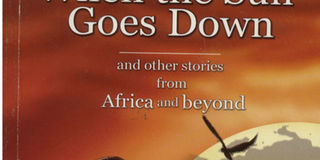An anthology with something for everyone

The cover of When the Sun Goes Down
What you need to know:
Comprising 16 short stories from various African countries and the rest of the world, the anthology exposes the readers to exciting stories that are relevant to our time and to our present day concerns.
Edited by Emilia llieva, an Associate Professor of Literature at Egerton University, Njoro and Waveney Olembo, a senior lecture in the Department of Literature at Kenyatta University, this is an anthology to look out for, not only for the creative works put in one, but its reliance on real life issues. The stories cut across borders and cater for everyone.
The anthology has stories from South Africa, Kenya, Tanzania, Uganda, Japan, India, Zimbabwe, Trinidad, Nigeria, USA, Malawi, Colombia, Morocco, Nigeria, and Namibia, an indication of the richness in themes and artistic works by the writers.
In the wisdom and beauty of narrative worlds, the readers discover reality in new and stirring ways and reminded of what a great gift it is to embrace living –with pain, struggle, learning, love, joy and realities in life in general and living life to the fullest albeit the ups and downs.
The stories are engaging as the themes relate to our society and offer a discursive mode to the things read. The stories carefully selected on HIV/aids, corruption, gender issues, environmental concerns, dehumanising and selfish acts of those perpetrating violence, provide the reader with a platform to debate and to offer their objective views discussing the themes and to influence change for a better world. Some of the themes handled in the anthology are more specific while others are of a more enduring nature.
For example the story, When the Sun Goes Down by Goro Wa Kamau from Kenya dramatises some of the attitudes, behaviours and possible futures of people infected with HIV. Twilight Trek by Sefi Atta from Nigeria also portrays such a common occurrence in Africa today as the emigration of Africans to the West lured by prospects of a better life often remains unrealized if not impossible and deceptive.
Catchy stuff
The anthology also puts into account male and female interactions and more evidently with the Marriage and Divorce Bill and gender violence, the stories come alive making it even easy to read the stories. The two catchy stories here, Two Stories Of A House by Leila Abouzeid from Morocco and The Bamboo Hut by Grace Ogot from Kenya show some of the effects of the traditional male dominance in homesteads. Of course, even the modern men would testify to being submissive to their wives. However, When the Sun Goes Down and some aspects of The Bamboo Hut illustrate the possibilities of understanding between the sexes, which is always a destabilizing issue in many homes.
Similarly, the African traditional values come alive in this anthology. For instance, Law of the Grazing Fields by Cyprian Ekwensi from Nigeria demonstrates how setting in daily activities and the way traditional values often clash with the rapid change of values in modern times. Likewise, Arrested Development by Sandisile Tshuma from Zimbabwe, which is set in modern, urban Africa, portrayed the reality of chaotic transportation, corruption and expedience and affirms the need for social order as well as personal honesty and integrity.
The stories, Tuesday Siesta by Gabriel Garca Marquez from Colombia and Sandra Street by Michael Anthony from Trinidad are examples of how descriptions of setting even of countries outside Africa, can draw us into the themes with which the stories are linked.
At a time when the world is reeling form global warming and environmental degredation Tuesday siesta and Sandra Street bring to focus the repercussions of neglecting one’s environment; talk about climate change. It is said nature can be extremely unforgiving and the sweltering heat and the need to take a siesta as depicted in the stories attest to this.
The need to give environmental concerns more attention therefore cannot be underestimated. The War of Ears by Moses Isegawa, our very own from Uganda brings to the readers the concerns about the emergence of militia groups and illegal gangs and the recruitment of child soldiers.
The story uncovers the dehumanising and selfish acts of those perpetrating violence, exposing the fear people face when society is riddled with insecurity.
These fascinating stories by Rayda Jacobs, Moyez G.Vassanji, Haruki Murakami, Anita Desai, Tillie Oslen, Stanley Onjezani Kenani and Jane Katjavivi, are beautifully crafted to make reading more pleasant.
The stories engraved in one package, bring into focus the need to appreciate diverse cultures and embrace the uniqueness that makes us one. The anthology is one to consider in your library.




